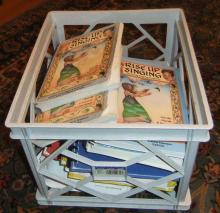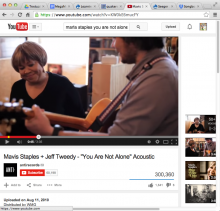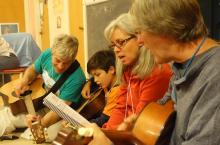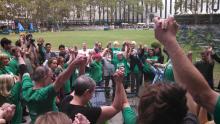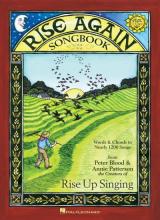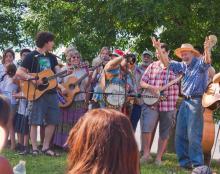Stories
(Send us your stories about experiences you had with Pete! Send them to rasongbook@gmail.com )
Here’s my Seeger story: In my NYC life, I designed an exhibit at the Municipal Art Society. Sonya Cohen (daughter of Penny Seeger and John Cohen) worked there. I didn’t know her from Adam, but we liked each other. I was boat-sitting for friends in the 79th Street Boat Basin in the Hudson, and Sonya visited. Said she liked boats in the Hudson. My friends were musicians, and Sonya said, yeah, she was from a musical family. Walking down the street, every few feet she’d say, yeah, my family is pretty musical….. Few more feet: yeah, we’re REALLY musical….. Few more feet: yep, we’re PRETTY WELL KNOWN. It took blocks for me to take the bait, then the big reveal.
Sad that we’ve lost her and John now. I met him here doing a small house event where good friends knew him. He played with Alice Gerrard. Very sweet.
And Mike Seeger did my favorite doc film about clogging (buckdancing). I discovered it 25 yrs ago, and now his stuff is digital at UNC! http://www.folkstreams.net/film-detail.php?id=121 - J
This Land Is Your Land Pete Seeger by Peter Ross (June 2005)
The September-October 1993 folknik included a letter of mine asking for some new verses for "This Land isYour Land" that are appropriate for the whole world, not just a part of it. That summer I had worked at Lake Baikal in Siberia with the Sierra Club, and we often sang at night with our Russian and Buryat coworkers. This Land is Your Land was our most popular song—we even made up verses in both English and Russian about Siberia—but the original verses such as “From California to the New York Island” seemed a bit too nationalistic to some of us.
As an afterthought I sent a copy of my folknik letter to Pete Seeger, whom my chorus the San José Peace Chorale had been fortunate to sing with in a benefit concert at Foothill College (Faith [the folk club's matriarch] was MC) in 1992. I wasn’t expecting a response, since Pete had told us during our two-hour rehearsal with him that he and his wife Toshi handled all of their correspondence and it was becoming increasingly burdensome. But several weeks later I got a nice letter from him, naturally on 100% Recycled Paper, in which he wrote, “Arlo says it stands for the world anyway, if you go from the redwood forests to the Gulf stream waters by way of Japan & Europe”! Since then several friends have told me that Arlo now incorporates this thinking-outside-of-the-box observation in his concerts.
Our rehearsal with Pete was very memorable, partly because he shared many anecdotes and bits of wisdom, several of which he used later in the evening concert.
My first Pete Seeger concert was around 1960 on the MIT campus, where the audience expected to watch and listen to him perform. But Pete, living up to the reputation bestowed on him by poet Carl Sandburg of being “America’s tuning fork”, had us singing along in four-part harmony!I’ll conclude with a pithy comment Pete didn’t share with us at Foothill, but did make at the end of a 1980 interview in Sing Out!: “Life is short, but art is long.”
- His suggestion of a motto for the world was “Plan, but plan for improvisation.” He said this saying came from jazz, but it also fit our concert, since partly due to our lengthy rehearsal (I expected a half-hour!) our chorale never got a sound check. This motto also reminded me of my favorite Woody Guthrie quotation, also used by Pete, “Take it easy, but take it.” [A great folk trivia question: who introduced Pete to Woody’s music? Answer—Will Geer, who played Grandpa Walton on the old TV show The Waltons.]
- Pete passed on humorist Russell Baker’s speculation that if Walt Whitman came back today, he would not write, “I hear America singing”. Rather, he would write that he saw America listening to expert music on marvelous Japanese equipment. David Dunaway wrote in his biography of Pete Seeger How Can I Keep from Singing, “In Sing Out!, Pete introduced songs he hoped would catch on, including one from the Georgia Sea Islands, ‘Michael Row Your Boat Ashore.’ He suggested people set up singing groups in each other’s houses: Hold pot-lucks and sing! If Pete had run the land, these clubs might have been a unit of government.”
- In encouraging us chorale members to interrupt him with questions or comments, Pete told of Winston Churchill’s response when he was asked if he minded hecklers. Churchill said that he didn’t mind them as long as he had the microphone.
- Pete shared some of his musical knowledge, such as the philosophical observation that all of the seeds in a pair of maracas make up the sound even though only one is exactly on the beat. Another observation was more bittersweet. Pete said that when he started having trouble with his voice he sought help from a voice teacher. She told him, too late, that all the years singing with his head thrown back probably permanently hurt his voice due to the strain on his vocal chords and neck muscles.
- Pete’s egalitarian spirit showed up in several ways. For example, he requested that our chorale wear street clothes instead of our more formal attire, so as to narrow the gap between audience and performers. In addition, he told us during the rehearsal that he had unsuccessfully tried to get co-performer Bob Reid to have equal billing for the concert with him and his sister Peggy Seeger.
- Thirty-some years ago, after a concert in Berkeley, Pete autographed my motorcycle helmet with a felt pen and really got into it, drawing a picture of a banjo and signing his name in both English and Japanese. This time around, at the end of our rehearsal I got Pete to autograph my bicycle helmet.
Memories of Pete Seeger on the Clearwater by Marilyn Ravina (formerly Marilyn Haslam)
Everyone who knew Pete Seeger, learned about his dream to clean up the Hudson River with a replica of the sloops that sailed in the 1800’s on the Hudson. His concerts raised money for this dream and soon the Sloop Clearwater was built.
My father, Reed Haslam, worked on the Clearwater in the early days of her Hudson River sails, in the 1970’s. He became the sailing master on board and by 1973 the Clearwater hired me as the cook and deck hand. I was thrilled to be on board hearing Pete play his banjo and sing for the passengers. Once while cooking down below in the galley, I heard him stomping over my head as he played “Abbey Yo Yo”. I ran up on deck to discover a large group of children in awe of Pete as he danced the story of a giant who eats cows whole. He was so charismatic in his humble and powerful way.
Another day Pete was on a sail with us and took on the job of being first on the throat halyard. The sloop has a throat and a peak halyard to raise the sail at two ends and on this day we had about ten people on each halyard. It was a large crew helping us hauls up the sails.
Pete began to lead the chantey our crew always used to raise sail. “In South Australia I was born heave away haul away, South Australia round Cape Horn and we’re bound for South Australia…” As he led the chantey, the crew vigorously pulled the line behind him. His job was to pull downward vertically on the throat halyard as it was guided through a block and then pulled by the crew horizontally down the deck. It was an important job that only an experienced sailor could do right—since they had to hold the line, tie it with a holding knot and secure it without losing an inch of line.
Suddenly the captain yelled out, “Slack the peak halyard.” The peak halyard had to be guided through stays and it was missing the mark. However our eager team on the throat heard him say “Slack” and the newcomers had just learned that term minutes earlier. In their excitement, they gave the line slack and Pete started rising up the mast by about ten feet. As he rose he never missed a beat in his chantey. Haul away you rolling Kings and bring me down, bring me down, Haul away you’ll hear me sing, we’re bound for South Australia.
I always knew I admired Pete, but here was an example of a man who never lost a beat, never left his post untended, and always had a song in his heart.
Scott Alarik tells the story of when Pete was banned from singing at a concert in Barcelona, Spain in the 1970's under Franco's dictatorship.





